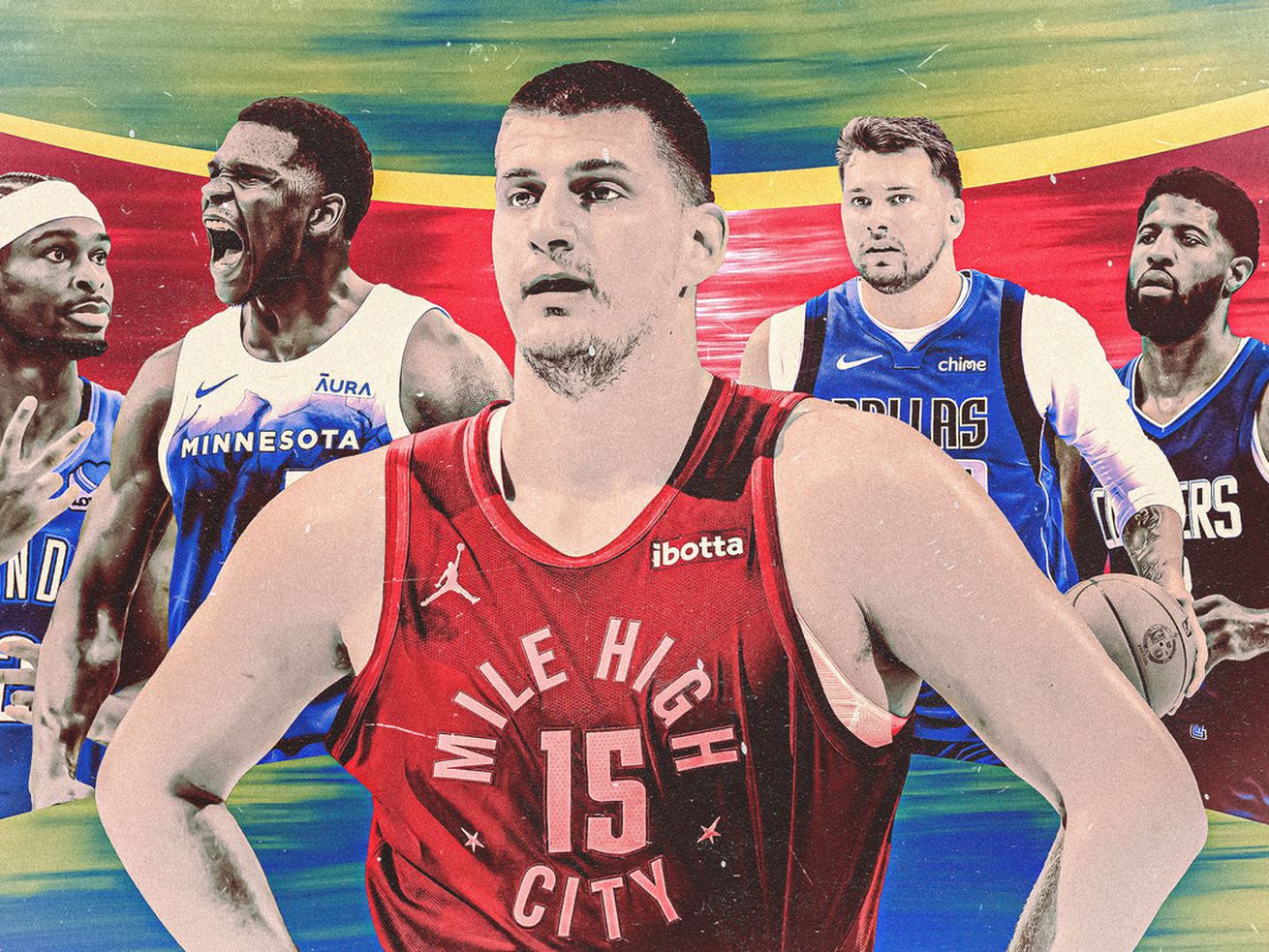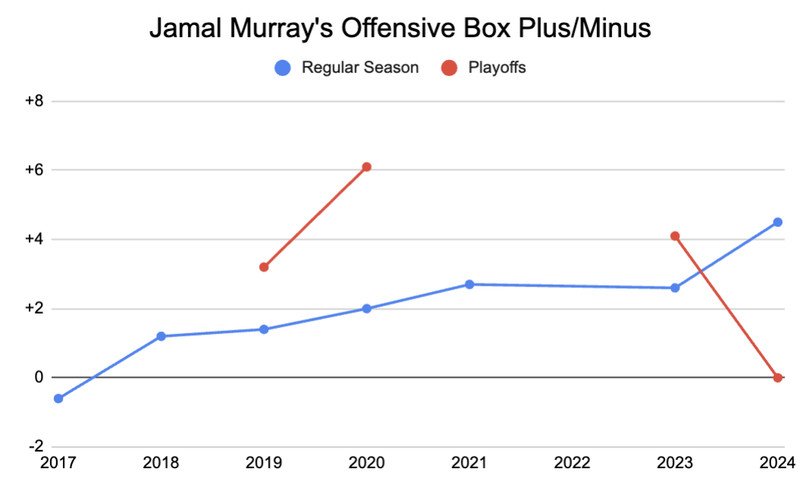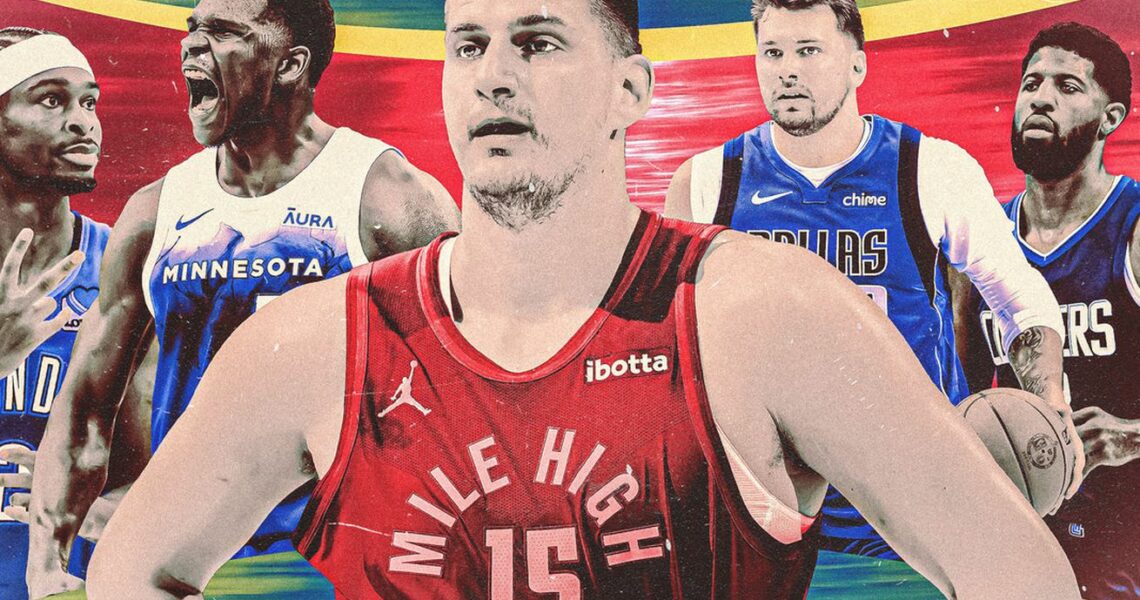
It’s not that Denver finally dropped a game to L.A. It’s that the Nuggets haven’t looked quite like themselves, Jamal Murray’s health is uncertain, and their Western Conference challengers have been even more dominant than expected.
One loss should never be the sole reason for panic in the postseason. The NBA structures its playoffs with best-of-seven series for a reason, so no matter how ugly or underwhelming or disheartening, one loss in isolation is never truly a disaster—especially when the losing team is already up 3-0 in the series, and potentially not as engaged in completing the sweep in Game 4.
So the Denver Nuggets shouldn’t be concerned because the Los Angeles Lakers finally beat them in one game, avoiding another sweep with a home win on Saturday night. Even the most lopsided rivalry in the modern NBA will produce an upset on occasion, and the Nuggets should still advance to the conference semifinals this week without breaking much more of a sweat.
But the Nuggets should be concerned because of the larger nature of their series against the Lakers, which has revealed problematic cracks in their title defense. The reigning champs aren’t just seeking the second championship in franchise history; they’re also attempting to cement their legacy as the defining team of an entire era of basketball, and their star’s legacy as a top-10 player in league history.
And yet, even with a 3-1 lead, developments both in the Nuggets-Lakers series and the rest of the Western Conference playoff field should give the Nuggets and their fans reason for some pause. Last season, Denver coasted to the title without ever facing major adversity, posting a 16-4 playoff record and never trailing in a series. This season’s path isn’t looking so smooth.
The Nuggets’ first issue is overarching because they’re falling short of the dominance that their current peers atop the Western Conference, and eventual champions throughout NBA history, have exhibited in the first round. Compare the top three seeds in the West in this postseason:
While the Lakers present an atypically formidable challenge for a no. 7 seed, they had a worse net rating in the regular season than both the Suns and the Pelicans without Zion Williamson, the first-round opponents for the Timberwolves and Thunder, respectively. So it’s not as if Minnesota and Oklahoma City look much better on this chart because they’re facing walkovers.
And the Nuggets’ numbers are shockingly mediocre; Denver has trailed on three-quarters of its offensive possessions in this round, according to an analysis of PBP Stats data. That places the Nuggets near the bottom of all 16 playoff squads, next to overmatched teams that have either already been eliminated or look to be on their way out soon:
For a direct comparison, when the Nuggets faced the Lakers in the conference finals last season, they trailed on only 36 percent of their possessions. The 2023-24 Nuggets have overcome that disparity by revving up their motor late in games—but while it’s great to be able to come back from a deficit, it’s even better to not need to come back at all.
First-round dominance tends to be an important barometer for title teams. The good news for Denver is that every championship winner in the past decade won its first-round series in four or five games, and the Nuggets can still check that box with a Game 5 win at home. But every championship winner in the past decade also comfortably beat its first-round opponent in net rating—and through four games, the 2024 Nuggets are at only plus-3.5 points per 100 possessions, less than half as good as the margin for any team on this chart.
Of course, that doesn’t mean the Nuggets have no shot at the 2024 title. Some eventual champions beyond the past decade, like the 2014 Spurs, 2010 Lakers, and 2008 Celtics, struggled to a greater extent to advance to the second round.
But team-level factors like point differential aren’t the Nuggets’ greatest concern stemming from their first four playoff games. That would be the state of Jamal Murray, who hasn’t played well in the first round and is now questionable for Game 5 with a calf strain. Murray typically elevates his game in the playoffs, with efficient scoring and clutch shooting and frequent explosions of 30-, 40-, and 50-plus points.
Until this postseason, apparently.

Murray’s surface stats against the Lakers look OK: 22 points, seven assists, and five rebounds per game, plus a dramatic buzzer-beater to win Game 2. Only four other players in the first round—Nikola Jokic, LeBron James, Jalen Brunson, and Luka Doncic—are averaging 20-7-5.
But Murray’s underlying numbers look much worse, as he is shooting just 38 percent from the field and 21 percent from distance. Out of 47 players with at least 40 shot attempts in the first round, Murray ranks 46th in true shooting percentage, and he has the highest usage rate of anyone near the bottom of the list.
Murray isn’t Denver’s most important player; that would be Jokic, who happens to rank second on the playoff true shooting leaderboard, all the way up at a nice 69 percent. (First place is James Harden, and third is Karl-Anthony Towns—what a first round for playoff underachievers!)
Jokic is one of the greatest playoff performers in NBA history and continues to produce at that pace this postseason. But even he can’t win on his own, and Murray is a crucial partner because of how the Nuggets lean on the duo’s two-man game in crunch time. If Murray looks more like a fringe All-Star-level player (as he does now) than a top-10 candidate (which he has in previous postseasons), or if he’s out entirely due to injury, then Denver’s supporting cast has a much smaller margin for error next to their MVP.
To be clear, Murray’s relative struggles come in a small sample, and pending his availability, he’s liable to flip the switch at any moment and give Jokic a reliable sidekick once more; at the very least, he won’t shoot close to 21 percent from 3-point range forever. But Murray’s underwhelming first round has come when defended mostly by Austin Reaves. Suffice it to say, the likes of Jaden McDaniels and Lu Dort—the preferred Murray defenders for the Timberwolves and Thunder, respectively—will present trickier matchups for the Nuggets’ lead guard in future series.
Even if Murray is able to continue playing through his calf injury, moreover, health and conditioning concerns may compromise his consistency in this postseason. Murray has dealt with various leg ailments over the course of the season, which limited him to 59 games.
By the time the playoffs began, Murray hadn’t reached even 30 minutes in a game in nearly a month; out of the Nuggets’ last dozen games, he didn’t play in seven, then returned but played only 21 to 29 minutes in the other five. And then he was thrust into playing 39, 40, 41, and 39 minutes over four straight games against L.A., as Denver’s lack of blowout wins meant big minutes from its starters.
The greatest weakness with Denver’s roster is a lack of depth, which makes the team particularly susceptible to injury. The Nuggets’ shallow bench can’t so much as cover for a depleted Murray, let alone replace him.
Speaking of those other Nuggets: Murray’s not the only Denver shooter struggling in this postseason. Take away Michael Porter Jr. (15-for-34) and the rest of the roster is making a ghastly 22 percent of its 3-point tries against the Lakers.
This statistic is simultaneously encouraging and discouraging. On the plus side, the Nuggets are nearly guaranteed to make more 3-pointers going forward: Through four games against the Lakers, they’re making only 25 percent of their wide-open 3s, according to NBA Advanced Stats. Based on the identity of those shooters and their regular-season performance, we’d expect Denver to have made 40 percent of its wide-open 3s in this series, which would rank in the middle of the playoff pack.
Opposing defenses will leave the likes of Gordon, and bench players Braun and Watson, open for jump shots as they focus on Jokic and Murray. Those role players must hit shots going forward to keep defenses honest, and four games is too small a sample to say they won’t in the postseason.
But the Nuggets’ unlucky shooting can’t excuse their unimpressive first-round point differential, because the Lakers are making only 26 percent of their wide-open 3s. If the Nuggets offense (which ranks only eighth in playoff efficiency despite facing a below-average Lakers defense) is destined to improve as open shots start falling, then the Nuggets defense (which ranks fifth in playoff efficiency) is destined to start sliding for the same reason.
Perhaps the strangest part of Denver’s muted margin in the first round is that it’s not a result of being crushed in the non-Jokic minutes, as is typically the case whenever the team struggles for any length of time. Denver has a plus-4.3 net rating when Jokic is on the court in the first round and a minus-1.9 net rating without him; that 6.2-point on/off difference pales in comparison to the 20.4-point difference they posted in the regular season.
The Nuggets’ preferred non-Jokic configuration, with Gordon at center, has actually held up just fine. The problem, instead, is that the team’s vaunted starting lineup has only been pretty good (plus-6.6 net rating) in a limited playoff sample, rather than spectacular (plus-13.6 in the regular season, plus-9.4 last postseason).
The most generous interpretation of all these facts is that the Nuggets are to some extent playing with their food; they know what it takes to win in the playoffs and they won’t overexert themselves early, especially against a team they know they can beat, and even more so after ripping out the Lakers’ hearts with the dramatic comeback in Game 2.
But at the same time that the 57-win Nuggets are doing just enough to win, the 57-win Thunder are steamrolling the Zion-less Pelicans, on pace for a potential sweep on Monday. And the 56-win Timberwolves didn’t just beat the Suns, but utterly eviscerated them in a sweep of their own.
And Denver will probably have to beat both of these high-quality opponents to return to the Finals. Minnesota is waiting in the second round with a roster built to combat Denver’s size, and a star, in Anthony Edwards, who will happily go mano a mano with Murray on the perimeter. And Oklahoma City—which is smaller but went 3-1 against Denver this season—is a favorite to reach the conference finals out of the other half of the Western bracket, in part because the Thunder should enjoy a hearty rest advantage in the second round over whichever team emerges from the Clippers-Mavericks tug-of-war.
Reflecting popular consensus, betting markets say the Nuggets remain heavy favorites to reach the Finals; FanDuel odds as of Monday morning say Denver is a more likely conference winner than Minnesota and Oklahoma City combined. But statistical models, from Basketball-Reference to ESPN to The Ringer, aren’t so convinced. That dichotomy makes sense, when examining the first half of the first round: On the surface, the Nuggets’ title defense looks fine, but under the hood, everything isn’t running as smoothly as expected for a top-tier contender with championship ambitions.

